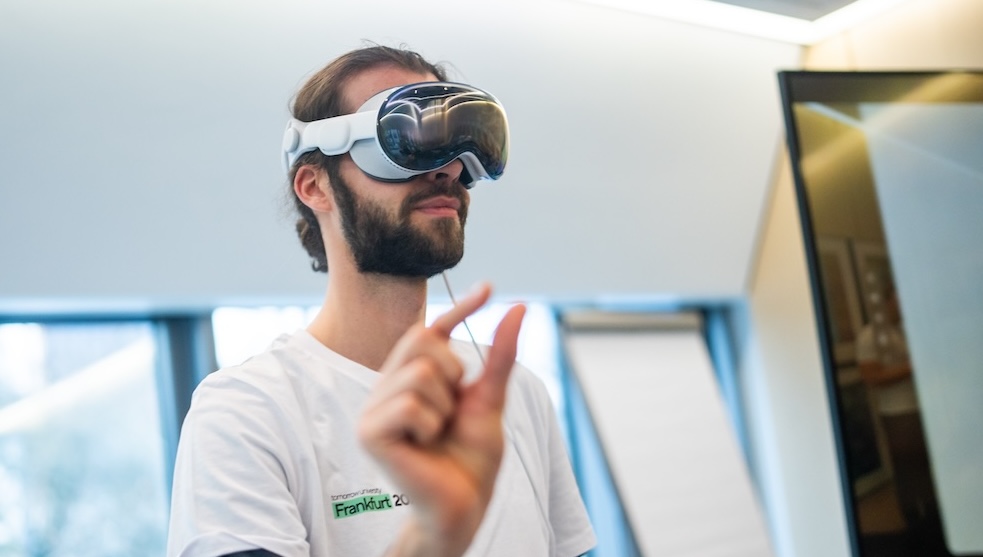What Is Challenge-Based Learning?
Forget memorization. Challenge-Based Learning puts real-world problems at the center of your education. Your Learning Journey at Tomorrow University Explore how this method empowers learners to solve meaningful issues with purpose.
.avif)
At ToU, challenge-based learning serves as the cornerstone of the learning model. Delve deeper into this approach and explore the exciting projects our learners are currently undertaking.
Challenge-based learning – what is it and why it matters
Education is constantly evolving, challenge-based learning is considered one of the best ways to learn new competencies and make an impact on our world because it provides an immersive, real-world learning experience that is highly engaging and relevant to learners. Unlike traditional teaching methods, challenge-based Learning is a multidisciplinary, collaborative, and hands-on approach that encourages learners to use technology to solve real-world problems. A challenge isn’t simply another name for a project or an assignment. Apple defines challenge-based Learning as an engaging approach to teaching and learning that encourages learners to develop a deeper knowledge of the subjects they study, accept and solve challenges, take action, share their experiences, and enter into a global discussion about important issues. But what does all this mean, and why does it matter?
Multidisciplinary approach
Challenge-based learning recognizes that real-world challenges don't map neatly onto discrete disciplines. By focusing on an issue rather than memorization of facts, this approach shifts the emphasis onto the application of knowledge and reflection on the process. Multidisciplinary learning integrates and applies knowledge, methods, and skills from different subject areas and multiple sources, fostering key competencies relating to critical thinking, collaboration, and reflection.
Real-world problems
Challenge-based learning is a variant of problem-based learning (PBL), which requires learners to use what they learn to solve real-world problems. This approach facilitates the development of declarative knowledge (factual information), procedural knowledge (process-based information), and structural knowledge (higher-order relationships and organizing principles). It also naturally leads to more collaborative learning, as learners work together to find solutions to complex problems.
Collaborative learning
Collaborative learning plays a crucial role in challenge-based learning. It facilitates deep learning, which derives from social constructivism, situated learning in collaborative contexts. Collaborative learning has been shown to improve motivation and engagement among learners. The Community of Inquiry is an educational community of individuals who collaboratively engage in purposeful, critical discourse and reflection to construct personal meaning and confirm mutual understanding. The community is based on social constructivism and points to the importance of social, cognitive, and teaching presence in maximizing effectiveness.
Self-determination theory
Self-Determination Theory (SDT) explains human motivation in relation to people's innate growth tendencies and innate psychological needs. It focuses on the degree to which human behavior is self-motivated and self-determined. Challenge-based learning recognizes three drivers for growth, namely competence, autonomy, and relatedness. By tracking competencies, challenge-based learning ensures that learners operate within their zone of proximal development (ZPD), which is neither too easy nor too difficult. Scaffolding, resources, and access to mentors are also provided to support learners' learning.
.avif)
The challenge-based learning model
To guide learners in solving real-world problems, challenge-based learning commonly employs the framework of "Investigate, Engage, and Act." At ToU, challenges are structured according to a specific model, which facilitates learners in investigating a problem, generating solutions, and ultimately taking action.
.avif)
Engage
In the first phase, learners are asked to engage with the problem and generate possible solutions. They may brainstorm ideas, prototype solutions, and test them out to see how well they work. The goal of this phase is to encourage creative thinking and problem-solving skills.
Investigate
In the second phase, learners are encouraged to explore and investigate the problem they are trying to solve. This involves conducting research, gathering information, and analyzing data related to the problem. Learners may work individually or in teams during this phase and are encouraged to collaborate and share their findings with each other.
Act
In the final phase, learners are encouraged to take action to implement their solutions and make a positive impact in the real world. This may involve creating a product, organizing a community event, or presenting their findings to a larger audience. The goal of this phase is to encourage learners to take ownership of their learning and see the impact they can have on their community and the world.
Overall, "engage, investigate, and act" is a powerful framework that can help learners develop critical thinking, collaboration, and problem-solving skills while addressing real-world problems.
As change makers, challenge-based learning is essential if we want future generations to develop unique problem-solving skills that will serve them well throughout their lives — both academically and professionally. Not only does this approach help foster creativity, but it also gives learners valuable experience by applying theoretical concepts directly within a context relevant to their studies and interests. Ultimately, challenge-based learning leads not only to greater understanding but also to greater impact.
See how the learners at ToU engage with challenge-based learning by exploring their key takeaways, ongoing projects, and favorite challenges.
If you want to experience challenge-based learning, try participating in our 3-week Trial Challenge called "Mission Identification," where you can identify your personal mission. Additionally, to foster lifelong learning, we recommend checking out our Bachelor's and Master's Degree programs.

.svg)
.svg)
.svg)



.webp)





